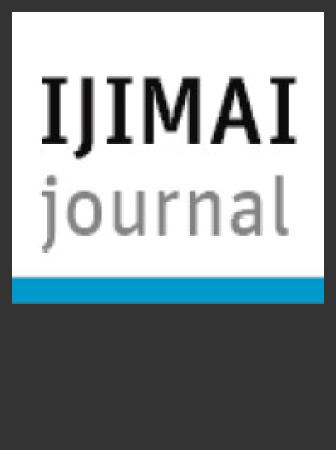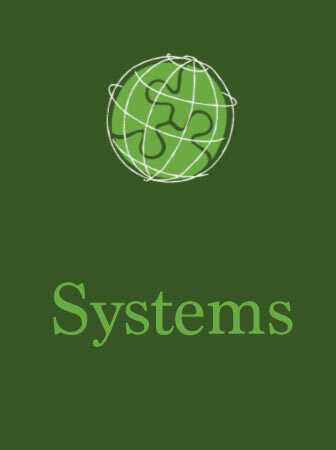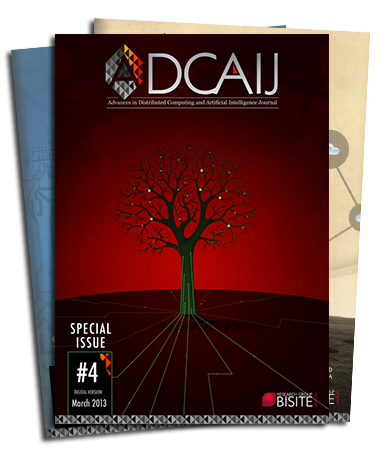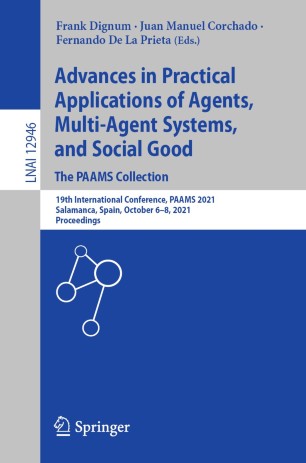Special Topic of the 2022 edition:
"Simulating complex systems"
Problems
- Agent-based simulation and prediction
- Distributed problem solving
- Agent cooperation and negotiation
- Agent societies and social networks
- Real-time multi-agent systems
- Human agent interaction, user interfaces
- Adaptation, learning and personalization
- Reputation, trust, privacy and security
- Agent engineering and development tools
- Evaluation, ethical and legal issues
Domains
- Information recovery and information systems
- Knowledge management and data intensive systems
- Intelligent control and manufacturing systems
- Embodied agents and autonomous systems
- Multi-robot systems and real world robotics
- Internet softbots and web intelligence
- Virtual agents, animation and games
- Pervasive agents and ambient intelligence
- E-learning and educational systems
- User-centered applications and assisting agents
Format
Authors should consult Springer’s authors’ guidelines and use their proceedings templates, either for LaTeX or for Word, for the preparation of their papers. Springer encourages authors to include their ORCIDs in their papers. In addition, the corresponding author of each paper, acting on behalf of all of the authors of that paper, must complete and sign a Consent-to-Publish form. The corresponding author signing the copyright form should match the corresponding author marked on the paper. Once the files have been sent to Springer, changes relating to the authorship of the papers cannot be made.
The maximum length of the papers is 12 pages, including figures and references:
Submission
All proposed papers must be submitted in electronic form (PDF format) using the PAAMS conference management system.
Review process
PAAMS welcomes the submission of papers and gives preference to the topics listed under the call. All submitted papers will undergo a thorough review process; each paper will be refereed by at least three experts in the field based on relevance, originality, significance, quality and clarity.
The papers must consist of original, relevant and previously unpublished sound research results related to any of the topics of the conference.
Publication
Accepted papers will be included in PAAMS Proceedings. At least one of the authors will be required to register and attend the symposium to present the paper in order to include the paper in the conference proceedings. All accepted papers will be published by LNCS/LNAI series of Springer Verlag.
*** Indexing: The books of LNAI and CCIS as part of LNCS series of Springer are made available to the following indexing services: Conference Proceedings Citation Index (CPCI), part of Clarivate Analytics’ Web of Science, EI Engineering Index (Compendex and Inspec databases), ACM Digital Library, DBLP, Google Scholar, IO-Port, MathSciNet, Scopus and Zentralblatt MATH. ****
The copyright's data for PAAMS 2022 (Main track) are:
- TITLE: Advances in Practical Applications of Agents, Multi-Agent Systems, and Complex Systems Simulation, The PAAMS Collection
- EDITORS: Frank Dignum, Philippe Mathieu, Juan Manuel Corchado, and Fernando De la Prieta
Download pre-filled form for PAAMS (Main Track)
Proceedings of PAAMS 2021 are available:
Advances in Practical Applications of Agents, Multi-Agent Systems, and Social Good. The PAAMS Collection
19th International Conference, PAAMS 2021
Editors: Frank Dignum, Juan Manuel Corchado, Fernando De La Prieta
More informationSpecial Issues
Authors of selected papers from PAAMS will be invited to submit an extended and improved version to special issues in different journals.








